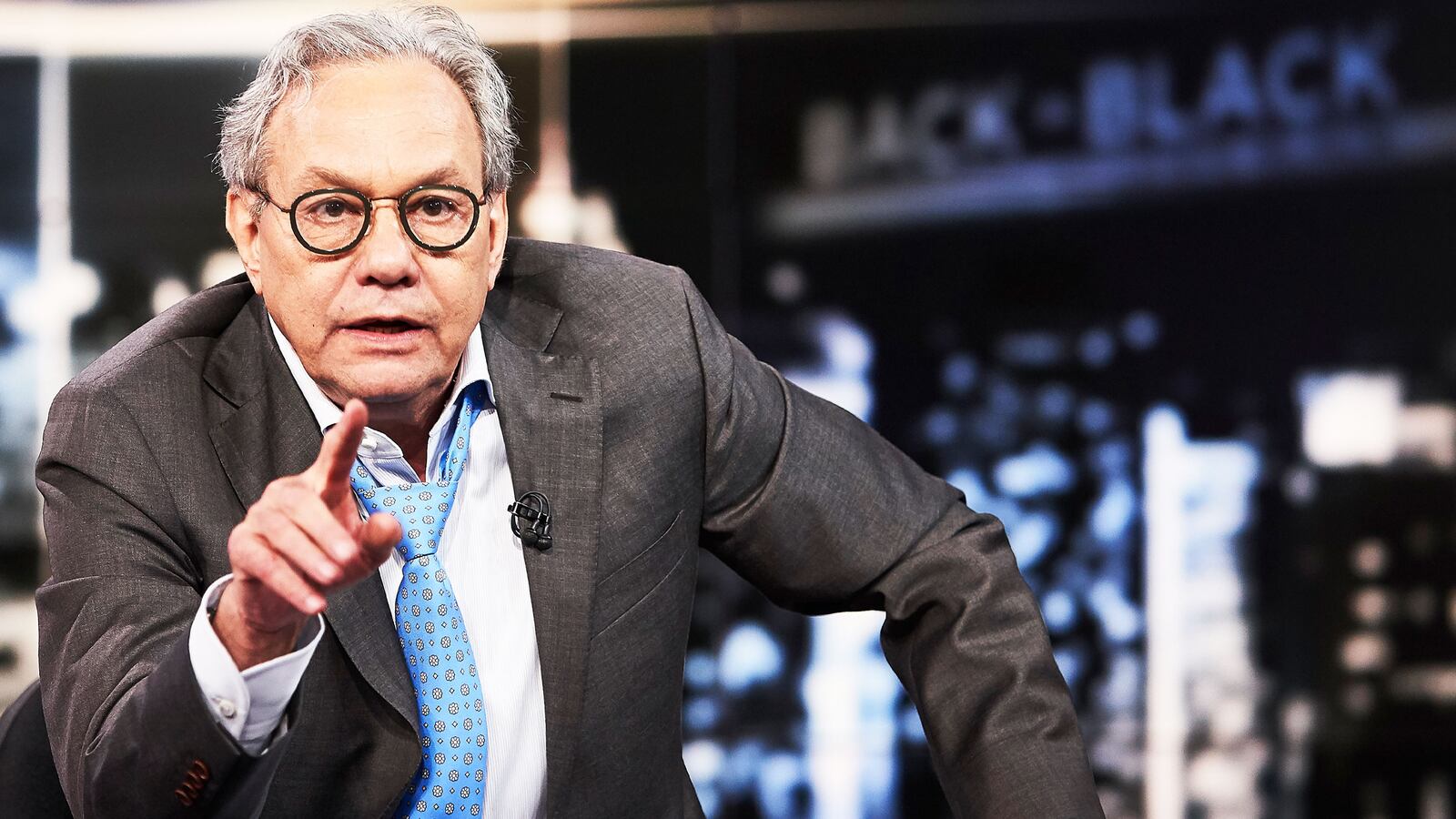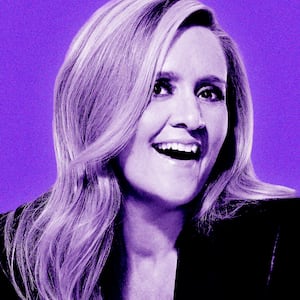After 27 years as a contributor on The Daily Show, Lewis Black is finally getting the chance to host. While the comedian candidly admits that it took Comedy Central long enough to give him a call, he is set to take the reins as guest host for the week of June 20—assuming the WGA strike is resolved by then.
In his return to The Last Laugh podcast, Black drops his angry persona and reflects on his comedic legacy. He also talks about why he called his latest stand-up special Tragically, I Need You—available to stream today on YouTube—and weighs in on misplaced conservative outrage over Bud Light and Fox News’ decision to fire “asshole” Tucker Carlson.
I casually ask Black how it’s going before we start recording, and he replies with deep sarcasm, “Oh, every day just gets better and better. How do we even ask that question anymore when every moment is just spectacular?” Moments later, the comedian’s signature anger comes roaring to life when he can’t find the headphone jack on his Apple laptop: “That would mean that it was built by a company that gives a fuck.”
In Tragically, I Need You, his follow-up to 2020’s Thanks for Risking Your Life, Black turns his ire toward those who have moved on from the COVID-19 pandemic in a way he hasn’t managed to do himself.
“It’s just unbelievable that we continue to act as if the pandemic occurred and now it’s gone!” he says. Black himself is still dealing with the impact of COVID, even though he is in the minority of Americans who have yet to contract the virus. “It affected everybody in one fashion or another,” he says. “I had never experienced certain things in my life, like depression and anxiety, until the pandemic.”
“Part of my brain is still stuck in COVID-ville and part of my brain is out of it,” he adds. It has consumed him partly because he has an “underlying condition,” and also, of course, because of his age. Black will turn 75 this summer, but he explains, “I’d never considered myself old until the pandemic, and then I was told I was old.”
As he enters what will inevitably be the final chapter of his comedy career, Black says he doesn’t spend too much time thinking about his “legacy”—even as he recognizes that since he never had children, all he will leave behind is his work.
“I don’t know if it matters anymore,” he tells me. “I got more successful than I ever expected. So I find myself, at this point, wondering if I’ve stayed too long at the fair. Is it time to wrap it up? I’ll stick with it as long as I can learn from the craft.”
Black can easily imagine walking away from stand-up comedy and currently feels like he has one, maybe two, more specials in him. After that, he says, “I want to enjoy my fucking self for a change.”
Below is an edited excerpt from our conversation. You can listen to the whole thing by subscribing to The Last Laugh on Apple Podcasts, Spotify, Google, Stitcher, Amazon Music, or wherever you get your podcasts, and be the first to hear new episodes when they are released every Tuesday.
I love what you say at the top of your new special, where you set up the expectation that the audience is not going to hear your jokes in the way that they’re intended. Essentially you tell them, “I’m going to be telling jokes, but you’re going to be feeling insulted.”
Yeah, it just kind of dawned on me that they were reacting as if I had a knife in my hand and was going to come into the audience after I said the joke, and come up to them and rip open their chest and eat their heart. Some of the reactions are so over the top.
Do you feel like this is a new phenomenon? Has it increased over the years that you’ve been doing this, that people somehow feel personally offended by what are just jokes?
Yeah. I mean, some of the guys stopped doing colleges, partly out of “PC,” partly out of “woke.” But I was always kind of prepared. I know that I’m gonna say something and they’re gonna kvetch about it, they’re gonna get irritated. And you kind of go, “Here’s what the joke was about, the joke wasn’t about what you think it’s about, you stop listening when you hear a word.”
I feel that you kind of thrive in those moments, too, where you get to react to the groans. You are able to latch onto that and enjoy it in some ways, it seems.
Well, I do, because it’s really—c’mon guys! It’s a bunch of adults in the room. What was the recent thing with Budweiser and the transgender model [Dylan Mulvaney]? Or “influencer.” The transgender thing, they get psychotic, but the influencer thing doesn’t disturb them? Somebody comes out of nowhere and all of a sudden this person is an influencer? I still don’t know how this fucking happens. But what you’ve really gotta wonder about is these folks who get so upset by this thing, because I did not see it.
Well, I think most people who were upset about it never saw it in the first place. They never would have seen it. They just heard about it and got upset.
That, to me, is the key to a lot of what’s happening. Because it opened up a Pandora’s box of nonsense that wasn’t there. They never would have heard about it.
It didn’t affect them in any way.
Not in the least. And then all of a sudden, these people go, “Look at this, it’s horrible! See how horrible this is?!” I wasn’t looking for it. And it’s not horrible. Now you’re gonna engage me in an argument about whether it’s horrible? Who cares? I just don’t like Bud Light. Where’s that discussion?
Well, this certainly feels like the type of thing that you might talk about when you are guest-hosting The Daily Show. Did it take a while to get that ask? I know you weren’t in the first round of people, but now you’re in this next round. What was your reaction to that?
Well, to be honest, when they first started going, “We’re going to have guest hosts,” I literally just said, “I want to be on. Can I sit in that chair once?” I’ve been on the show 27 years.
Longer than anybody else!
“Could I please sit in the chair?” I sent it out immediately, as soon as I knew [Trevor Noah] was leaving. And they started talking about how they were going to have these guest hosts. And was pretty pissed at that.
That you weren’t on that list at the beginning?
That none of us were! None of the correspondents. And I just thought, come on, guys, throw a bone. And it really undermines, too, something that I felt about this show for years, which is, it undermines the importance of the writers on that show. So it’s not just who’s sitting in that seat. It’s the guys and the women in the back who were pumping out all sorts of stuff on a daily basis.
Obviously they started with some big names, and that was probably part of the plan, but now it’s been great seeing the correspondents in there as well—Roy Wood Jr., Jordan Klepper.
Yeah, but I have to say, I was like, come on, every single time you do it out of etiquette. And you’ve got people who’ve been watching the show forever and are attached to the show and know all of the correspondents. I thought Roy did a terrific job, Jordan did a terrific job, they’re all going to be really good. I’m not going to be good, but they’re going to be terrific! [Laughs]
Hey, that’s not true! I just had Samantha Bee on the podcast recently and I was pretty surprised to learn from her that she didn’t get a call to come be one of the guest hosts. Nobody reached out to her.
Which I don’t get. They reached out to Hasan [Minhaj]. And I’m not disparaging having these folks on, I think it’s great. I just think they should have started with us. But I’m thrilled to be able to do it.
Yeah, it’s exciting that you’re going to be able to sit in that main chair for the first time after being on the show for, as you said, nearly three decades. How do you feel like you’re going to approach it?
Well, I wish I knew. I know that the approach is based on the audience. My approach to anything is based on being in front of an audience, and so there’s a comfort level I have there. If I get the laugh, great. If I don’t get the laugh, I know how to get the laugh. I’ve been doing this way too long. And so I’m looking forward to that. The writers know how to write in my voice. People always ask, “Do you write your own stuff for The Daily Show?” And the answer’s “No.”
I remember talking to you about that, that you really don’t even choose the topics for “Back in Black.”
No. They took it from me early on and it was because a couple of producers on the show didn’t feel like I belonged. And they didn’t feel I was funny. They wanted a punchline rather than an attitude. But my part of what has been my bread and butter as a comic is my attitude. The attitude gets the laugh. My initial reaction has always been confrontational when it comes to the workspace. I’m always like, “I’m not going to take this shit,” and I would walk away. And then I thought, I can’t walk away, what am I thinking? I’m not gonna walk away from this. You want to write it? Go ahead. What I had to do was take what they were giving me and put it in my own voice. So it was like an acting gig. Now, all of them know my voice, so it’s never a problem. And I love the way they write.
So that attitude makes you feel better about going in as a host?
Yeah, because I have an amazing trust in what they’ll write. I will throw in my two cents here and there. And I’ll have to say, “No, we’re not going to say that I’m old for the 36th time.” But mostly I think it’ll be fun.
Listen to the episode now and subscribe to The Last Laugh on Apple Podcasts, Spotify, Google, Stitcher, Amazon Music, or wherever you get your podcasts, and be the first to hear new episodes when they are released every Tuesday.





